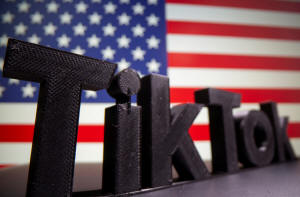Pelosi undecided if U.S. House will take up TikTok government device ban
 Send a link to a friend
Send a link to a friend
 [December 16, 2022]
By David Shepardson [December 16, 2022]
By David Shepardson
WASHINGTON (Reuters) -Speaker Nancy Pelosi said on Thursday she had yet
to decide whether the U.S. House of Representatives will join the Senate
in backing legislation to bar federal government employees from using
Chinese-owned TikTok on government-owned devices.
"We're checking with the administration - just in terms of language -
not in terms of being opposed to the idea," Pelosi told reporters. "I
don't know that that will be on the agenda next week, but it's very,
very important."
The House would need to pass the Senate bill before next week's expected
end of the congressional session.
House Republican Leader Kevin McCarthy said on Twitter Pelosi "should
immediately allow an up-or-down vote" on the TikTok government device
bill.
If the House approved the measure, it would go to President Joe Biden
for consideration.
The Senate voted on Wednesday to bar federal employees from using the
Chinese-owned video app TikTok on government-owned devices. It was the
latest action on the part of U.S. lawmakers to crackdown on Chinese
companies amid national security fears that Beijing could use them to
spy on Americans.
TikTok has said the concerns are largely fueled by misinformation and
that it is happy to meet with policymakers to discuss the company's
practices.

It said the Senate bill "will do nothing to advance the national
security of the United States."
The legislation would not impact the more than 100 million Americans
that use TikTok on private or company owned devices.
White House spokeswoman Karine Jean-Pierre Thursday declined to offer a
view on whether Biden would support the TikTok legislation. "We're going
to let Congress move forward with their process," she said.
There are a range of tech apps including TikTok that are not allowed to
be used on White House and other federally owned devices "for security
reasons," Jean-Pierre said.
Many federal agencies, including the Defense, Homeland Security and
State departments, already ban TikTok from government-owned devices.
[to top of second column]
|

A 3D printed Tik Tok logo is seen in
front of U.S. flag in this illustration taken October 6, 2020.
Picture taken October 6, 2020. REUTERS/Dado Ruvic/Illustration/File
Photo

Georgia Governor Brian Kemp said Thursday the state is joining North
Dakota, Idaho and Iowa this week and a growing number of U.S. states
in banning ByteDance Ltd-owned TikTok from state-owned devices amid
concerns that data could be passed on to the Chinese government.
Kemp's order also bars the use of Tencent Holdings' WeChat app and
Russian-owned Telegram on government devices.
The U.S. government Committee on Foreign Investment in the United
States (CFIUS), a powerful national security body, has for months
sought to reach a national security agreement to protect the data of
U.S. TikTok users, but it appears no deal will be reached before
year's end.
It said it hoped that rather than continuing down that road,
Republican Senator Josh Hawley, who sponsored the Senate bill, would
urge the Biden administration to advance an agreement that would
actually address his concerns.
Democratic Senator Dick Durbin urged Americans to stop using TikTok.
"Maybe America has finally reached the point where we realize that
our innermost secrets, privacy, security are at stake here," Durbin
told MSNBC.
Republican Senator Marco Rubio on Tuesday unveiled bipartisan
legislation to ban TikTok altogether in the United States. At a
hearing last month, FBI Director Chris Wray said TikTok's U.S.
operations raise national security concerns.
In 2020, Republican then-President Donald Trump attempted to block
new users from downloading TikTok and ban other transactions that
would have effectively blocked the app's use in the United States
but lost a series of court battles over the measure.
(Reporting by David Shepardson; Editing by Howard Goller, Jonathan
Oatis and Alistair Bell)
[© 2022 Thomson Reuters. All rights
reserved.]
This material may not be published,
broadcast, rewritten or redistributed.
Thompson Reuters is solely responsible for this content.
 |